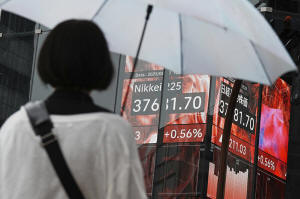World shares are mixed after modest gains put Wall St close to records
[June 03, 2025] By
ELAINE KURTENBACH
Asian shares were mostly higher Tuesday while European benchmarks gave
up early gains.
The futures for the S&P 500 and the Dow Jones Industrial Average fell
0.5%.
Markets in China advanced despite a report showing manufacturing
activity slowed in May, even after China and the U.S. paused tariff
hikes to allow time for talks.
In early European trading, Germany's DAX was nearly unchanged at
23,950.36, while the CAC 40 in Paris shed 0.4% to 7,709.40. Britain's
FTSE 100 slipped 0.2% to 8,757.97.
Adding to uncertainty in a region already enduring war in Ukraine,
Poland elected Karol Nawrocki, a conservative historian and staunch
nationalist, Monday as its next president in a closely watched vote that
signaled a resurgence of right-wing populism in the heart of Europe.
The survey of Chinese purchasing managers, or PMI, by the financial
media group Caixin showed factory output, new export orders, purchasing
activity and staffing all declined last month. Incoming new work
contracted at the quickest pace in over two-and-a-half years. the report
said.
The situation is “a body blow to the backbone of China’s economy: small
and mid-sized exporters now caught in a brutal vice grip between
faltering global demand and a Washington-led tariff regime that’s more
carrot-and-stick diplomacy than ceasefire,” Stephen Innes of SPI Asset
Management said in a commentary.
However, as is often the case, investors shrugged off the bad news with
the assumption that it might raise the likelihood of more market support
from Beijing.

Hong Kong's Hang Seng jumped 1.5% to 23,512.49, while the Shanghai
Composite index rose 0.4% to 3,361.98.
Tokyo's Nikkei 225 edged 0.1% lower to 37,446.81.
South Korean markets were closed for a snap presidential election
triggered by the ouster of Yoon Suk Yeol, a conservative who now faces
an explosive trial on rebellion charges over his short-lived imposition
of martial law in December.
In Australia, the S&P/ASX 200 climbed 0.6% to 8,466.70. In Taiwan, the
Taiex gained 0.6%, while India’s Sensex lost 0.5%.
[to top of second column] |

A person stands in front of an electronic stock board showing
Japan's Nikkei index at a securities firm Tuesday, June 3, 2025, in
Tokyo. (AP Photo/Eugene Hoshiko)
 Beijing and Washington dialed back
trade friction slightly as the U.S. extended exemptions for tariffs
on some Chinese goods, including solar manufacturing equipment, that
U.S. industries rely on for their own production.
The U.S. Trade Representative extended those exemptions, which were
due to expire on May 31, by three months through Aug. 31.
The U.S. side said President Donald Trump was expecting to speak
with Chinese leader Xi Jinping this week. A Chinese foreign ministry
spokesperson said Tuesday that they had no information on that.
Just a few weeks ago, the United States and China agreed to pause
many tariff hikes that had threatened to drag the U.S. economy into
a recession.
On Monday, U.S. stock indexes drifted closer to their records
following a stellar May, Wall Street’s best month since 2023.
The S&P 500 rose 0.4% and the Dow industrials added 0.1%. The Nasdaq
composite climbed 0.7%.
Trump has been warning that U.S. businesses and households could
feel some pain as he tries to use tariffs to bring more
manufacturing jobs back to the country, and their on-and-off rollout
has created lots of uncertainty.
In other dealings early Tuesday, the yield on the 10-year Treasury
fell to 4.42% from 4.44% late Monday.
Worries remain over how much debt the U.S. government will pile on
due to plans to cut taxes and increase the deficit.
U.S. benchmark crude oil was up 27 cents at $62.79 per barrel. Brent
crude, the international standard, picked up 18 cents to $64.81 per
barrel.
The U.S. dollar rose to 142.90 Japanese yen from 142.71 yen. The
euro slipped to $1.1414 from $1.1443.
All contents © copyright 2025 Associated Press. All rights reserved |